Responding
These slides are available for use with this section of the presentation. For information about downloading presentation slides, see Introduction.
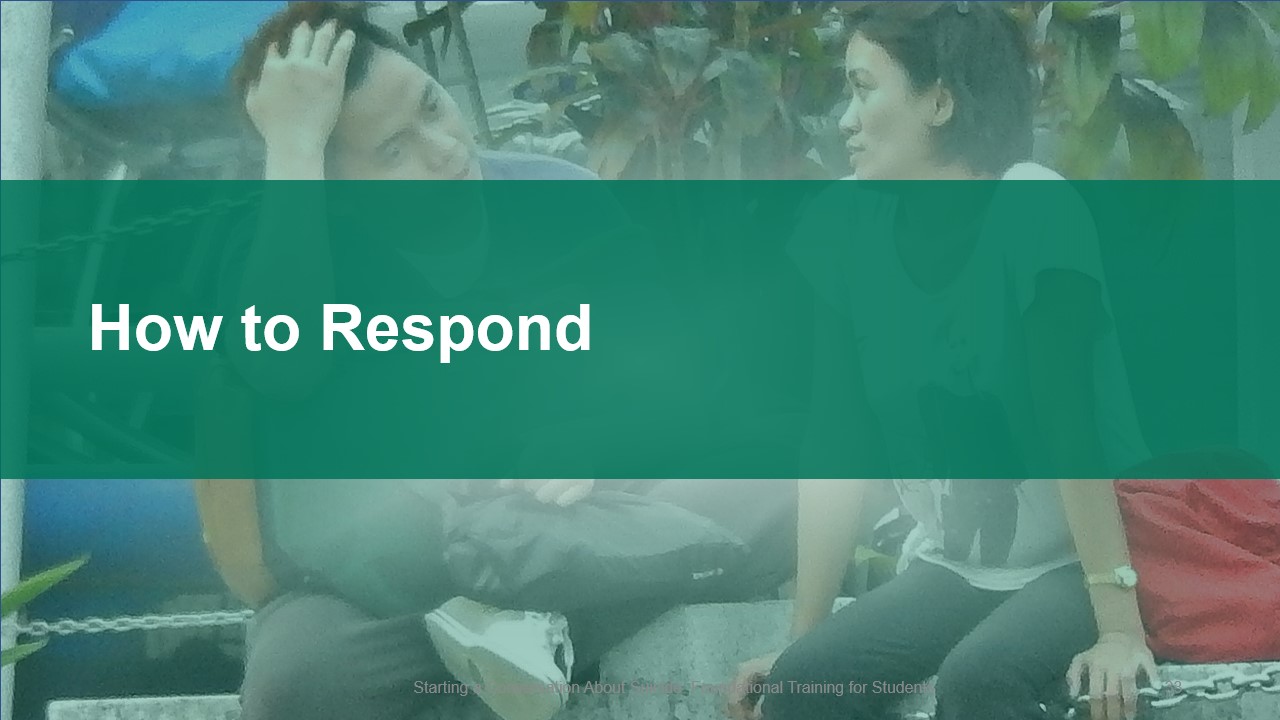
If you observe things that lead you to suspect that someone may be suicidal, it is important to check it out in more detail.
It can be difficult to acknowledge clues that seem to indicate that someone you know may be planning to kill themselves. But it can be tragic to disregard them.
- Trust yourself. Believe your suspicions and be aware.
- The aim is to connect someone who is having thoughts of suicide with other supports.
- Remember: If someone is in distress, you will not increase the risk of the person taking their own life by asking if they are thinking of suicide.
What Does a Person in Distress Need?
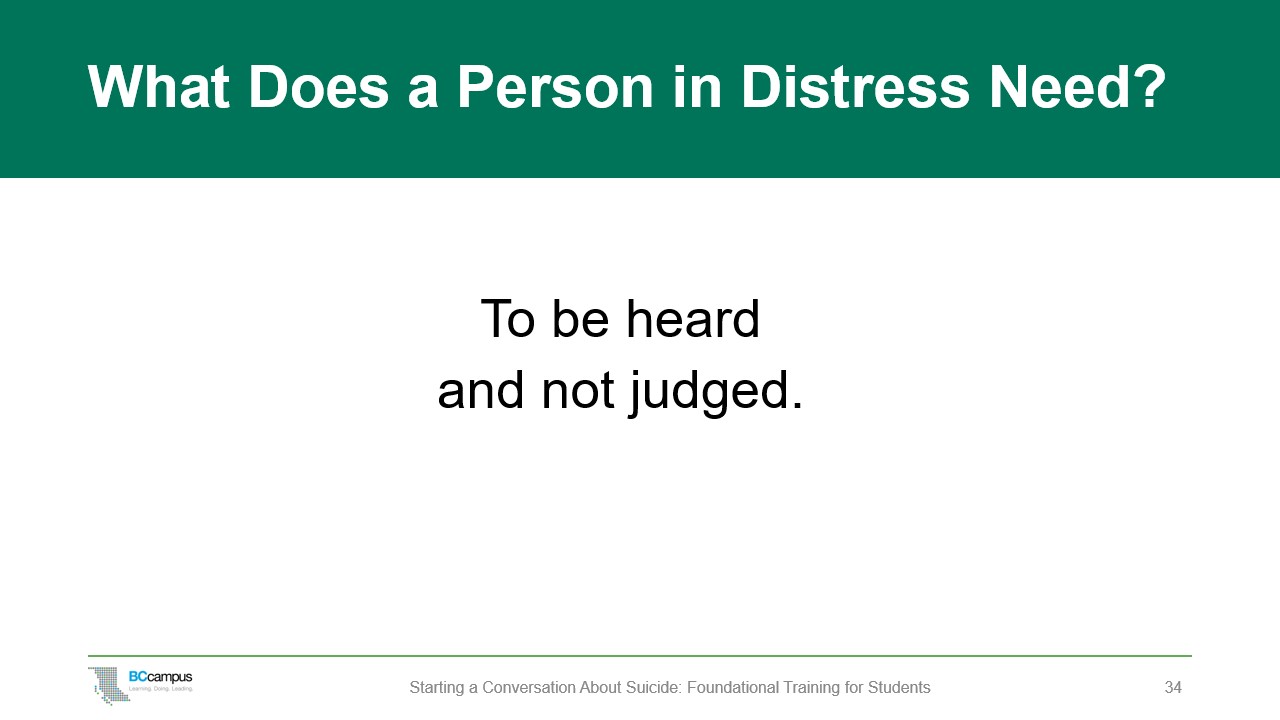
The main thing that people in distress need is to be heard and not judged. The most effective intervention is to listen to them with empathy and be non-judgmental.
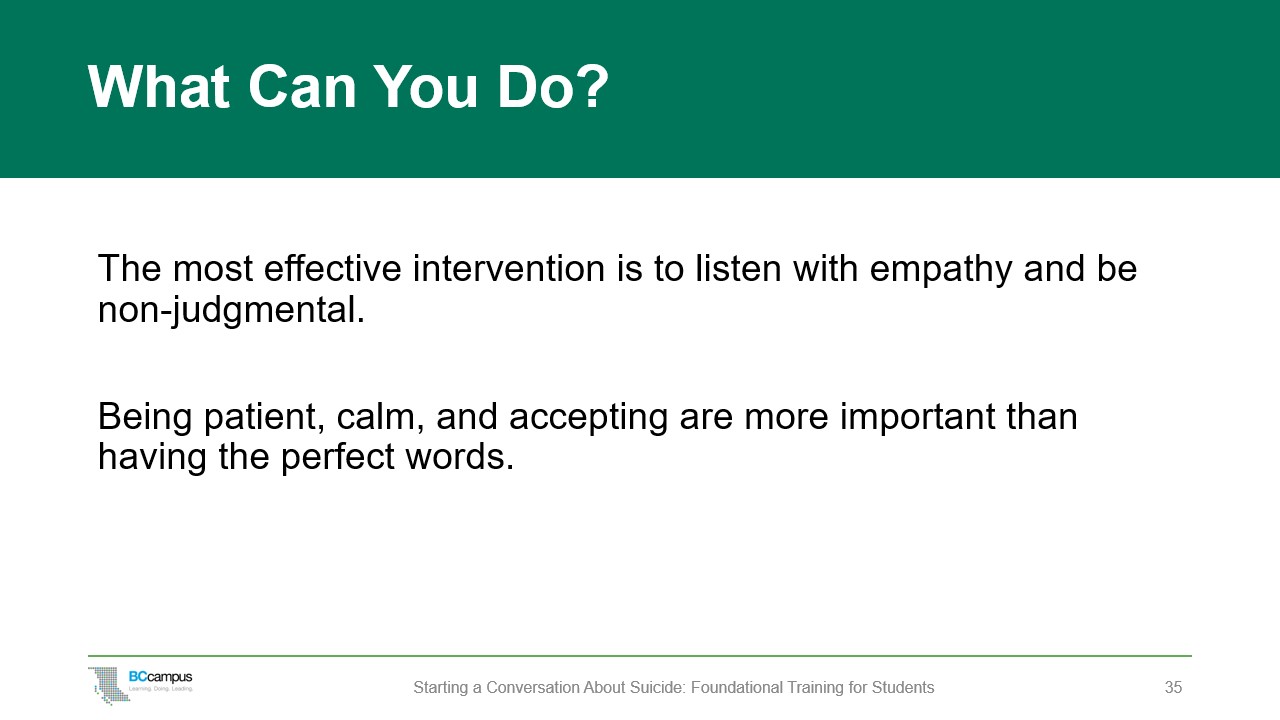
Let the person know you hear them, believe them, and understand their distress as best you can. Tell them that you will help connect them with appropriate resources.
It does not have to be a lengthy conversation. Sometimes a conversation and a referral can be made within 10 minutes. What is most important is that the conversation is based on active listening and care. Sometimes just a few genuine words of concern and understanding can make a big difference and help get a person to connect with a counsellor or the best person to help them. You can’t take away their pain or solve their problems. But you can care.
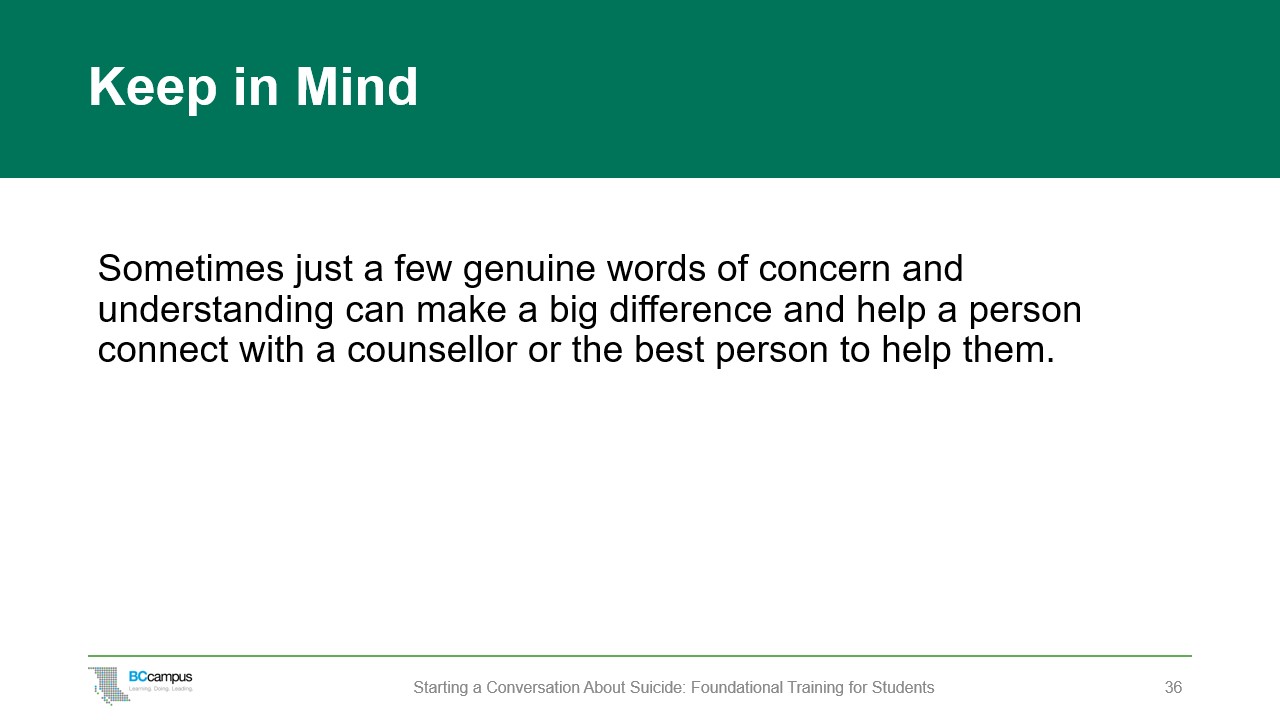
There are no magic words. If you are concerned, your voice and manner will show it.
Being patient, calm, and accepting is more important than having the perfect words.
You may think that it’s all just talk and wonder how that’s going to help, but asking a person how they are doing and inviting them to talk about how they feel greatly reduces feelings of isolation and distress. Simply talking about their problems will give a suicidal person some relief from loneliness and pent-up feelings. They become aware that another person cares, and this can give them a feeling of being understood. A conversation can take the edge off their agitated state, and it may help them get through a bad night.
Communicate your concern for the person’s well-being by offering to listen. Good listening is more than just listening quietly. It means demonstrating that you can be supportive without being judgmental. It means accepting the person’s feelings as their truth, no matter how irrational they might appear to you. It means that you are comfortable enough with your own feelings to set them aside and listen to theirs.
If someone has previously tried to die by suicide, there is an increased risk that they will try again. This doesn’t change what you say. You need to emphasize how much they matter and that they are not alone, and find ways to connect them with appropriate help in as timely a manner as possible.
What Else Can Help?
- Approach with concerned care.
- Understand with empathy.
- Recognize and relate with kindness.
- Ask with respect.
- Lead with hope.
- Introduce help with community.
![]() Adaptations
Adaptations
To demonstrate how to respond in a helpful, compassionate way, you could show a short video from well-known sociologist Brené Brown: Brené Brown on Empathy. The BCcampus resource Starting a Conversation About Mental Health: Foundational Training for Students also provides more information on developing empathetic listening skills if you want to explore empathy more with your group.
How to Start the Conversation
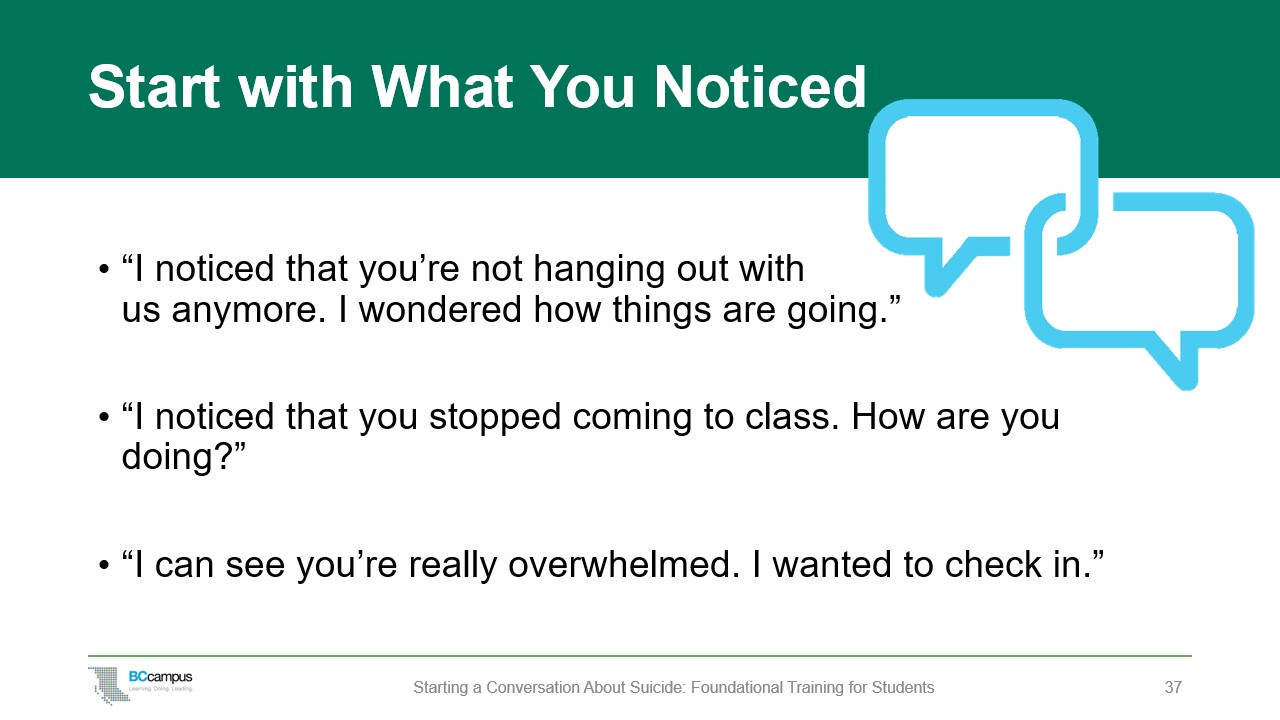
To start, you can mention things you’ve noticed and ask how the person is doing. For example:
- “I noticed that you’re not hanging out with us anymore. I wondered how things were going.”
- “I noticed that you stopped coming to class. I wanted to see how you’re doing.”
- “I can see you’re really overwhelmed. I wanted to check in.”
Other ways to start the conversation:
- “I’ve noticed you’ve been really quiet lately. That’s not like you. Is everything okay?”
- “I wonder if what’s happening at school these days is stressing you out.”
- ”With everything that’s going on in your family, I wonder if you’re feeling overwhelmed.”
These questions can start a conversation with someone you are concerned about, and this is also just normal empathic human interaction. You can check things out without it being a scary conversation. The goal is to practise asking about things you have noticed and to probe and listen for other warning signs.
Ask Directly and Clearly About Suicide
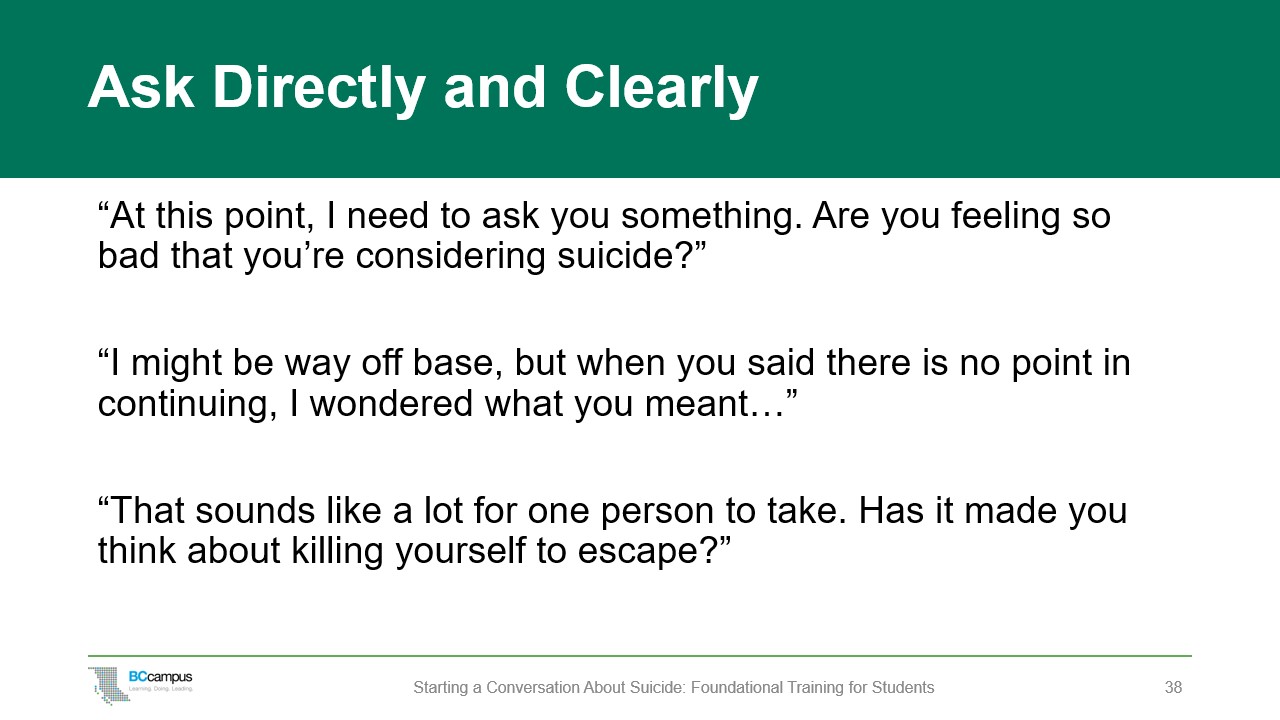
It’s important to use direct language when asking someone if they are thinking about suicide. Using a word like “suicide” or asking if someone is “thinking of ending their life” in a direct way says to the person, “We can talk about this here,” and it opens up the conversation.
Talking openly and responsibly about suicide also lets the person know they are not alone, that there are people who want to listen and help. Most people are relieved to finally be able to talk honestly about their feelings, and this alone can reduce the risk of a suicide attempt.
For example:
- “At this point, I need to ask you something. Are you feeling so bad that you’re considering suicide?”
- “I might be way off base, but when you said there is no point in continuing, I wondered what you meant…”
- “That sounds like a lot for one person to take. Has it made you think about killing yourself to escape?”
Other ways to ask about suicide:
- “Has all that pain you’re going through made you think about ending your life?”
- “I see what you are doing and how much you must be hurting. I’m concerned about you. I want to talk. I want to hear what’s going on with you.”
What Not to Say
What you don’t want to do is minimize the other person’s problems or pain. Avoid saying things like:
- “Things aren’t that bad.”
- “This too shall pass.”
- “You’re being so dramatic.”
- “It could be worse.”
- “You think you have it bad. A lot of people have it worse.”
What If They Say They’re Not Thinking About Suicide?
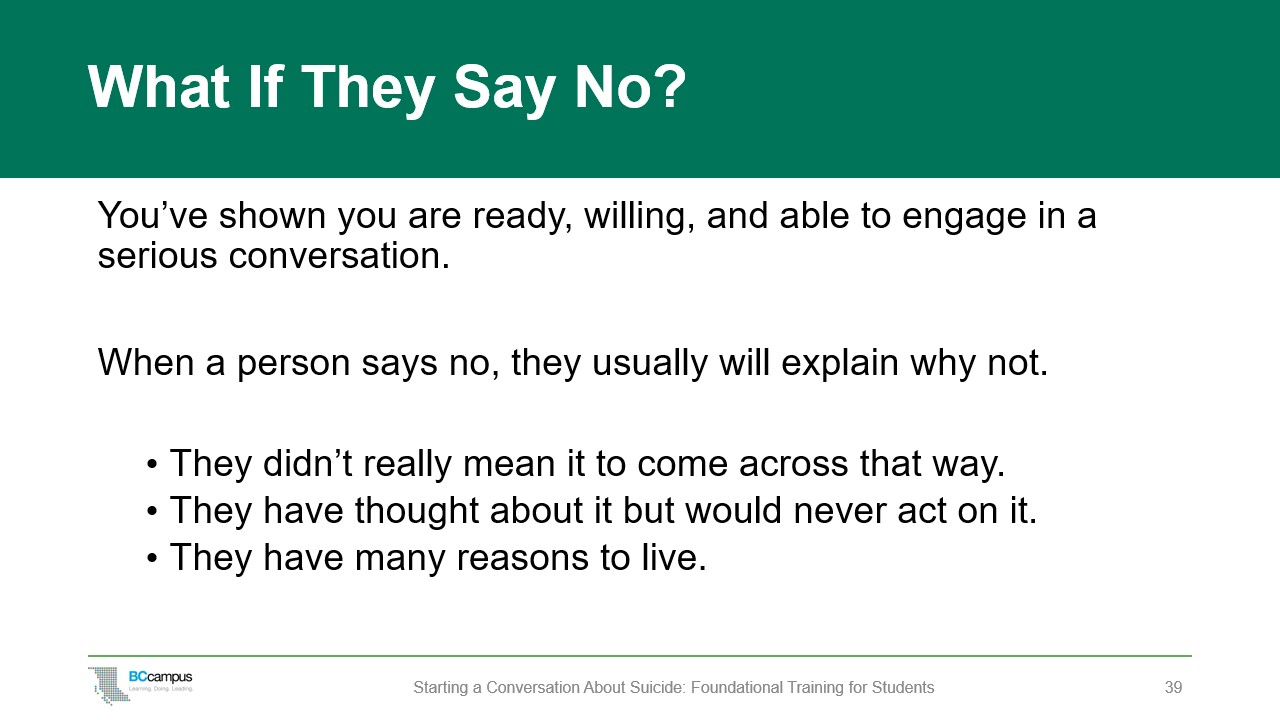
If the person says they are not thinking of suicide, accept their response. You’ve shown you are ready, willing, and able to engage in a serious conversation.
When a person says no, they usually will explain why not:
- They didn’t really mean it to come across that way.
- They have thought about it but would never act on it.
- They have many reasons to live.
They may say they have stronger reasons for living and usually are reluctant and have concerns about the effect on others they care about. Listen supportively and offer resources as necessary.
What If They Say They Are Thinking of Suicide?
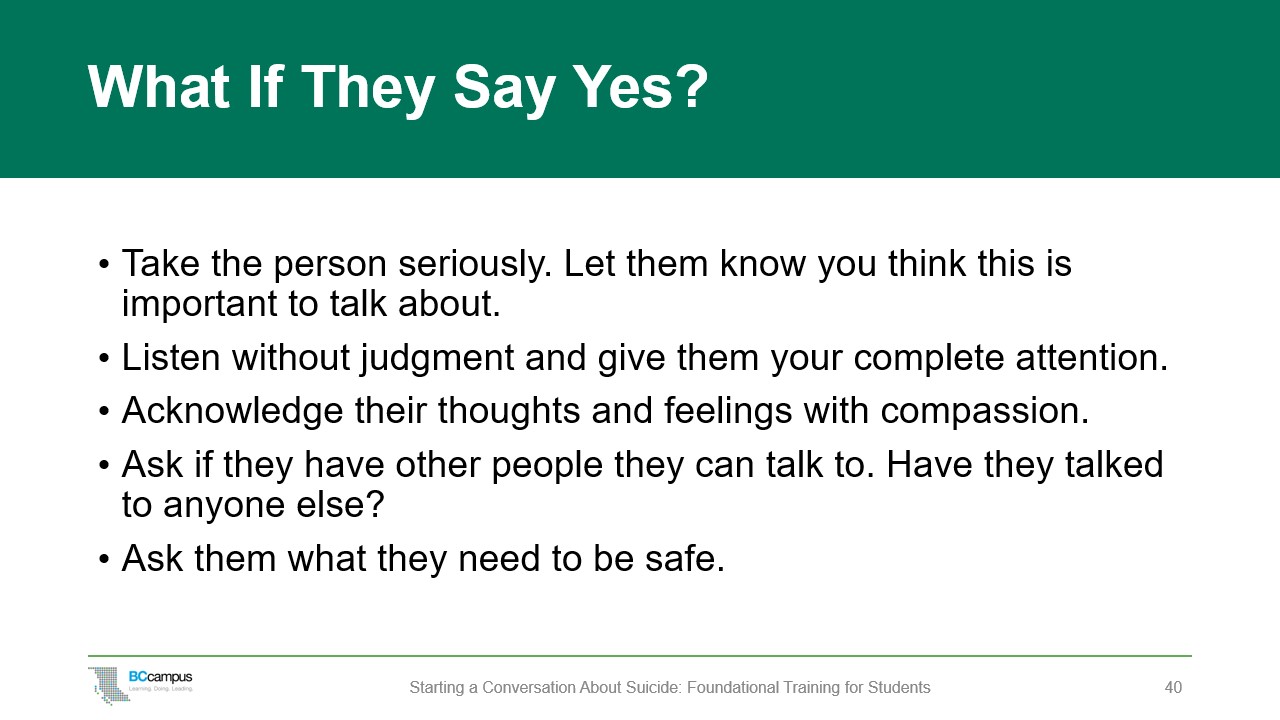
If a person says they are thinking about suicide:
- Take them seriously. Let them know you feel this is important to talk about.
- Listen without judgment and give them your complete attention.
- Acknowledge their thoughts and feelings with compassion.
- Ask about their personal supports. Ask if they have other people they can talk to. Have they talked to anyone else?
- Ask them what they need to be safe.
Consider the Risk
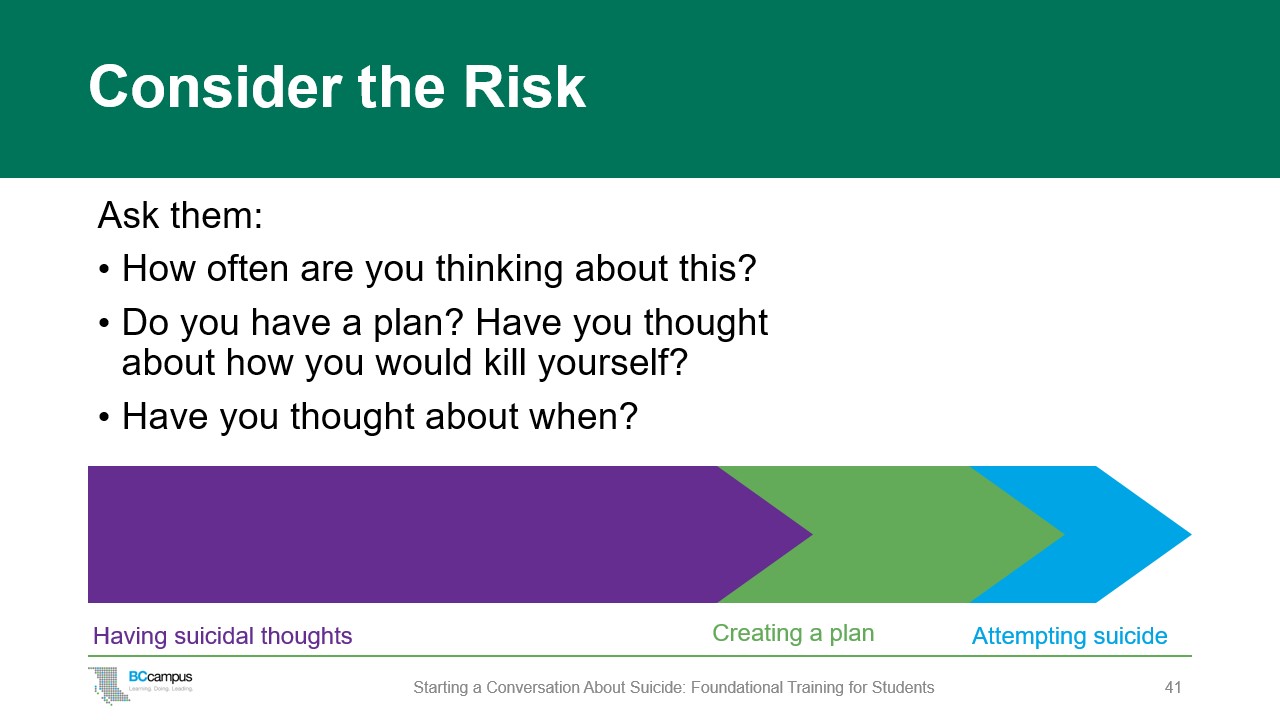
If a person says they are thinking of suicide, you need to consider the risk. Ask them:
- “How often are you thinking about this?”
- “Do you have a plan? Have you thought about how you would kill yourself?”
- “Have you thought about when?”
Keep in mind that “assessing risk” doesn’t mean you’re responsible for assessing the person’s mental health. By asking these questions, you can get a sense of how serious they are. The more prepared they are (that is, the more immediate and concrete their plans are), the greater the risk.
Remember: The goal is to keep the other person safe. Now is not the time to solve all problems.
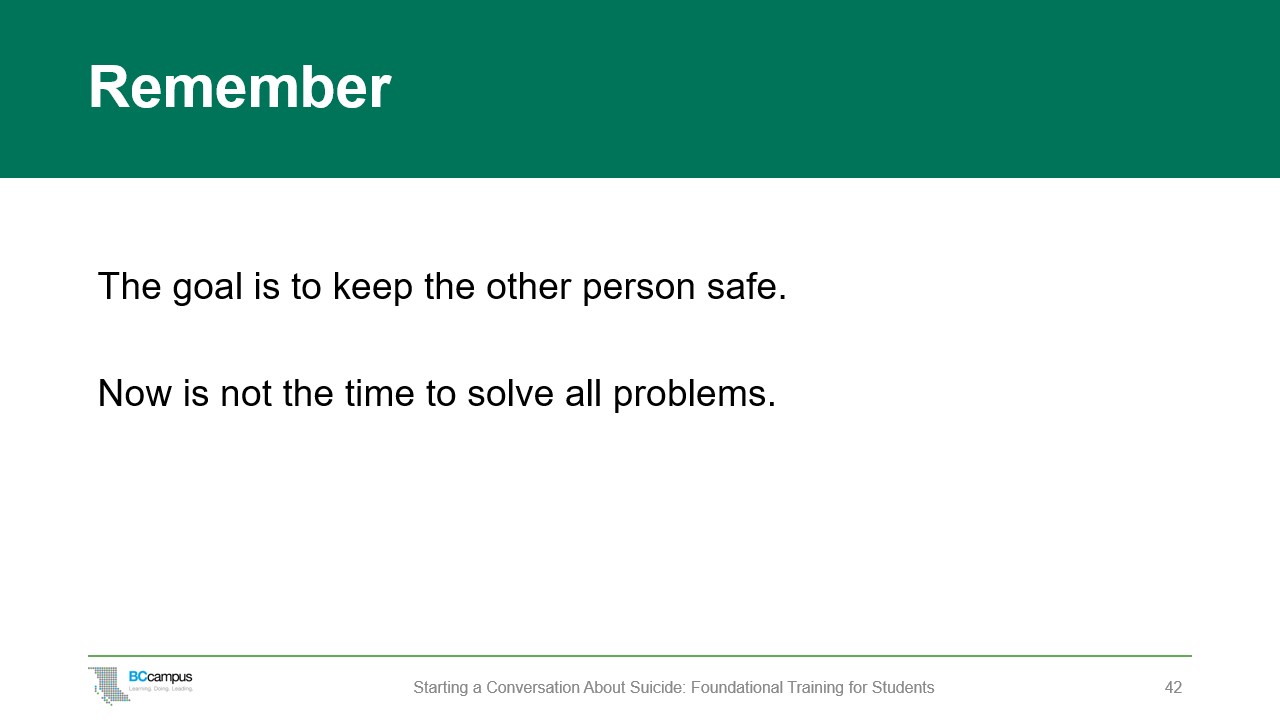
It is similar to taking a trip and the preparations a person makes before the trip. How serious is this person about the trip? Are they just talking about wanting to take the trip? Have they started looking into trip destinations? Or are they really prepared for the trip and have already booked their flight and started packing their bags?
More often than not, people do not have a plan for suicide, but if the plan is immediate, if steps have already been taken (e.g., the person has taken pills or seriously injured themselves), or if a conversation is not possible, call 911 and stay with the person until help arrives.
Responding Online
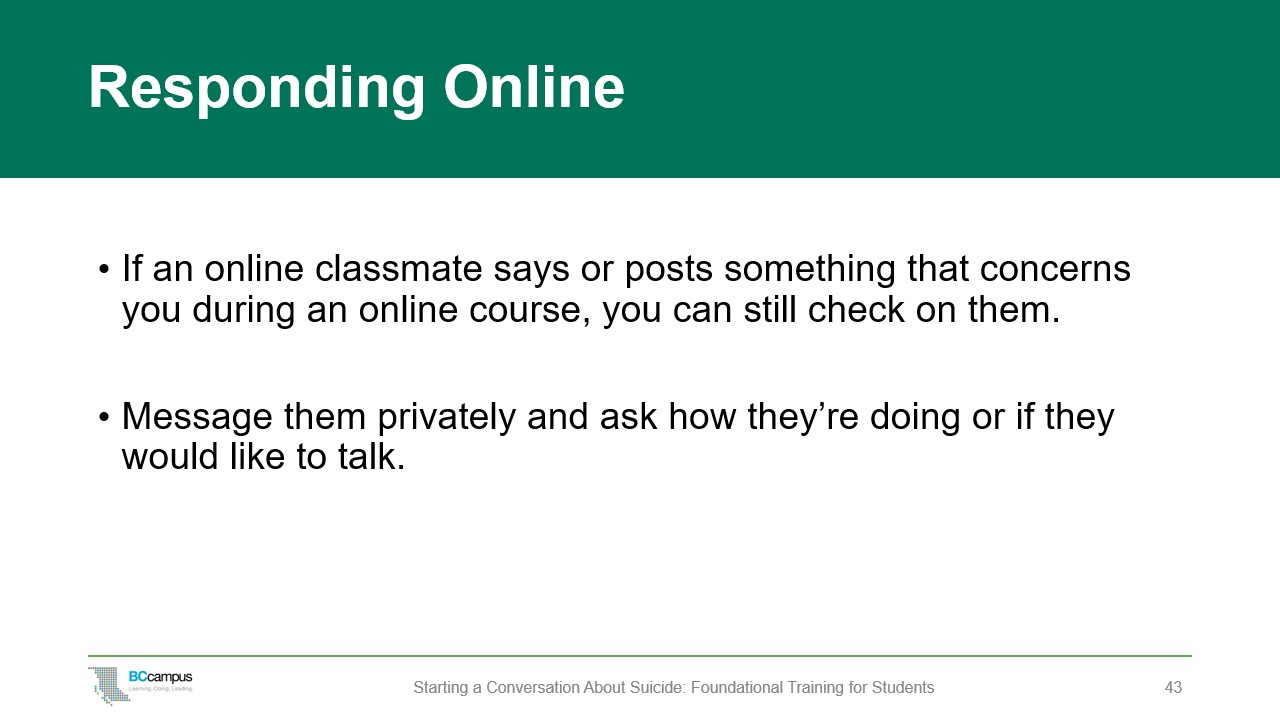
Online learning isn’t going away anytime soon. Some students take only online courses and may feel isolation and mental health issues more acutely because of it.
In an online class, you may sometimes catch glimpses of a classmate’s struggles in something they post or from a response or comment they make in a discussion. For example, a student may say in a post, “Sorry I’m late in posting, I’ve been struggling lately.” Or they may say in a small group discussion something like “I’m overwhelmed and not sure I can continue.”
Even though you are not face to face, you can still check in with your classmate and offer support. You can contact them via private message to ask how they’re doing and if they need to talk. Everything may be fine, but they will really appreciate hearing from someone who cares. If things are not fine and they say they are really struggling, you can also suggest online supports. Most post-secondary institutions have online resources and phone numbers students can call for referrals, or you can suggest that they contact one of the provincial mental health or crisis lines.
Media Attributions
- Friends Talking by Michael Coghlan is licensed under a CC BY-SA 2.0 License.
- Brené Brown on Empathy is an RSA short licensed under a Standard YouTube license. Voice: Dr Brené Brown. Animation: Katy Davis (AKA Gobblynne) www.gobblynne.com. Production and editing: Al Francis-Sears and Abi Stephenso.

